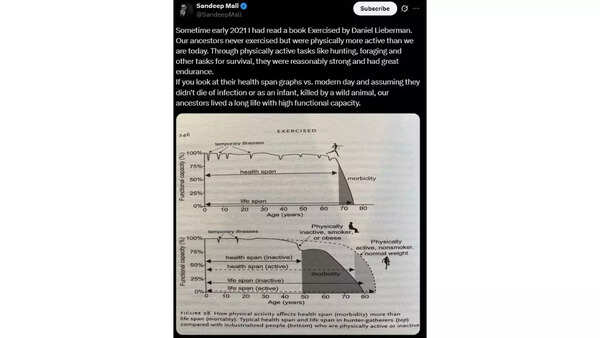
In today’s modern times of the Gen Z world, workouts, fitness challenges, and goals are misunderstood and dominate wellness conversations. According to them, intense workouts are the only way to get through a muscular body- but is the human body built to do so? However, the Harvard evolutionary biologist Dr. Daniel E. Lieberman recently debunks the modern fitness myths with the central idea that the human body evolved to chase energy but not peak performance.
Physical workout is important, but overtraining in modern culture is not the only breakthrough to achieve a healthier lifestyle. Instead, he proposes a return to our biological roots of moderate movement, walking, and sustainability over high-intensity regimens.
Harvard scientist explains why humans weren’t designed to exercise like we do today
According to Lieberman, what we call “exercise” today is a modern anomaly. Our ancestors never went for a run or lifted weights for the sake of fitness.
Instead, their physical activity was always tied to survival—hunting, foraging, building, or migrating. “We have to do this weird thing called exercise, which is voluntary physical activity for the sake of health and fitness—something nobody did until very recently,” says Lieberman.This insight flips the script on how we view exercise. While it's important for health today, it was never something humans were naturally inclined to do unless absolutely necessary.
Lieberman emphasizes that humans are biologically designed to store energy, not waste it. He refers to humans as “unusually fat creatures”—not as a judgment, but as a biological reality. Our bodies evolved in unpredictable environments where food was scarce.
Conserving energy ensured survival.From this perspective, it's natural that people struggle with workout motivation—our bodies are wired to avoid unnecessary exertion, not seek it out.
That’s why pushing too hard can often feel more draining than invigorating.

Source: X
Why walking is considered the most natural workout
One of Lieberman’s most profound insights is that walking is the most evolutionarily consistent form of exercise. Early humans walked the equivalent of thousands of kilometers a year not because they wanted to, but because they had to. In today’s world, walking remains one of the healthiest, low-impact activities. Simple actions like walking to the next bus stop, taking the stairs, or strolling during lunch breaks align more closely with our natural biology than extreme fitness routines.
Just 21 minutes a day: Harvard biologist’s formula for a longer, healthier life
Lieberman is critical of the modern fitness mindset that equates suffering with success. He argues that moderation is far more effective and sustainable than intensity. Research shows that just 150 minutes of moderate activity per week—around 21 minutes a day—can reduce the risk of early death by 30%. Rather than pushing for marathons or brutal gym sessions, Lieberman encourages people to move consistently in ways they enjoy, emphasizing that small habits have big payoffs.

Dangers of overtraining and burnout
Social media and modern fitness trends often glamorize extreme performance. But Lieberman warns that this can lead to overtraining, injury, and burnout, especially among young people chasing unrealistic goals.“The obsession with optimum performance is overrated,” he says. “High performance is just achieving your goals and staying active—it doesn’t need to mean winning medals.” He urges people to focus on function and longevity rather than aesthetics or performance metrics.

Is skipping a workout okay? Here’s what Harvard expert says
For many, skipping a gym session or not hitting a step goal leads to guilt. But Lieberman’s evolutionary perspective offers relief. If humans weren’t designed for constant physical strain, then rest is not failure—it’s biological wisdom. His message encourages balance: move regularly, but don’t obsess. By understanding how our ancestors lived, we can free ourselves from toxic fitness narratives and instead embrace a sustainable, guilt-free approach to health.Dr. Daniel Lieberman’s research presents a compelling case for rethinking how we move. Exercise doesn’t need to be extreme to be effective. Consistency, moderate movement, and enjoyment are what truly benefit our health. Walking, resting, and listening to your body may be the most natural and healthiest choices you can make.Also Read | No time for 10k steps daily? Try this Japanese walking technique that gives 10 times the benefits in 30 minutes

 5 hours ago
48
5 hours ago
48




























 English (US)
English (US)